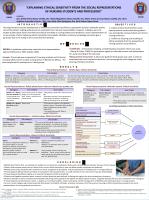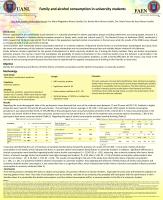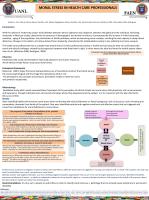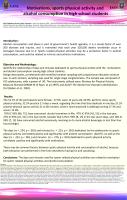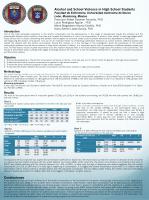| dc.contributor.author | Castillo, Bertha Alicia Alonso | en |
| dc.contributor.author | Alonso-Castillo, Maria Magdalena | en |
| dc.contributor.author | Castillo, Maria Teresa de Jesus Alonso | en |
| dc.contributor.author | Rodriguez, Nora Nelly Oliva | en |
| dc.contributor.author | Garcia, Nora Angelica Armendariz | en |
| dc.contributor.author | Garcia, Karla Selene Lopez | en |
| dc.date.accessioned | 2016-03-21T16:32:16Z | |
| dc.date.available | 2016-03-21T16:32:16Z | |
| dc.date.issued | 2016-03-21 | |
| dc.identifier | CONV15SC1.1 | en |
| dc.identifier.uri | http://hdl.handle.net/10755/602581 | |
| dc.description | 43rd Biennial Convention 2015 Theme: Serve Locally, Transform Regionally, Lead Globally.` | en |
| dc.description.abstract | Session presented on Saturday, November 7, 2015 and Sunday, November 8, 2015: Nursing education requires development of awareness and ethical sensitivity in appropriate decision making for quality care of the patient, helping professionals to understand their role and responsibilities. However, in Mexico were not located studies about factors that influence ethical sensitivity in nursing students and professors. Social representations of nurses may be a factor explaining ethical sensitivity. Since beliefs, attitudes, emotions, knowledge and values give a particular way in the acting of the nurses with their patients. Objectives: Explain ethical sensitivity from social representations constructed during patient care provided by nursing students and professors. Define the meaning and modeling of ethical sensitivity from the perspective of nursing students and professors. Methodology: A qualitative method was used with social representations approach (Moscovici; 1983; Jodelet, 2002. A theoretical sampling, considering data saturation criteria was used. Sample: 23 students and 10 professors of nursing from Monterrey, Mexico participated. Results: The main categories of the meaning of ethical sensitivity emerged: Beliefs, Attitudes, Emotions and Values of ideal models of behavior and ultimate goals. Beliefs factors that obstruct quality care were reported: Human and material resources, professional competence, work routines and behavior of the patient for their disease condition. Factors that promote quality care; Confidence given by the patient, ethical sensitivity of nurses. Ethical sensitivity was defined as an ability to listen and attend the needs of the patients, a skill that one is born with but also can be developed. It was also mentioned that ethical sensitivity was essential for a holistic care. Empathy was identified as essential component of ethical sensitivity. Positive attitudes were identified: Be more accepted by the patient, and a faster recovery of the patients, negative attitudes as envy or competence with colleagues. They identified emotions as feeling the anguish or sadness of the patients. They also narrated the important values in quality care as responsibility, respect, equity as well as the consequences of ignorance of Bioethics and values in nursing practice. Conclusions: The main category was ethical sensitivity that derives from beliefs, attitudes, emotions and values. All of them, give a meaning to ethical sensitivity according to the social representations of nursing students and professors. | en |
| dc.format | Text-based Document | en |
| dc.language.iso | en | en |
| dc.subject | Ethical | en |
| dc.subject | Nursing | en |
| dc.title | Explaining Ethical Sensitivity from the Social Representations of Nursing Students and Professors | en |
| dc.type | Poster | en |
| dc.rights.holder | <p>
All rights reserved by the author(s) and/or publisher(s) listed in this item record unless relinquished in whole or part by a rights notation or a Creative Commons License present in this item record.
</p><p>
All permission requests should be directed accordingly and not to the Sigma Repository.
</p><p>
All submitting authors or publishers have affirmed that when using material in their work where they do not own copyright, they have obtained permission of the copyright holder prior to submission and the rights holder has been acknowledged as necessary.
</p> | |
| dc.description.note | Items submitted to a conference/event were evaluated/peer-reviewed at the time of abstract submission to the event. No other peer-review was provided prior to submission to the Henderson Repository, unless otherwise noted. | en |
| dc.type.category | Full-text | en |
| dc.contributor.department | Non-member | en |
| dc.author.details | Bertha Alicia Alonso Castillo, RN; Maria Magdalena Alonso-Castillo, RN; Maria Teresa de Jesus Alonso Castillo, RN; Nora Nelly Oliva Rodriguez, RN; Nora Angelica Armendariz Garcia, RN; Karla Selene Lopez Garcia, RN | en |
| dc.conference.name | 43rd Biennial Convention | en |
| dc.conference.host | Sigma Theta Tau International, the Honor Society of Nursing | en |
| dc.conference.location | Las Vegas, Nevada, USA | en |
| dc.date.conferenceyear | 2015 | |
| dc.description.reviewtype | Abstract Review Only: Reviewed by Event Host | en |
| dc.description.acquisition | Proxy-submission | en |
